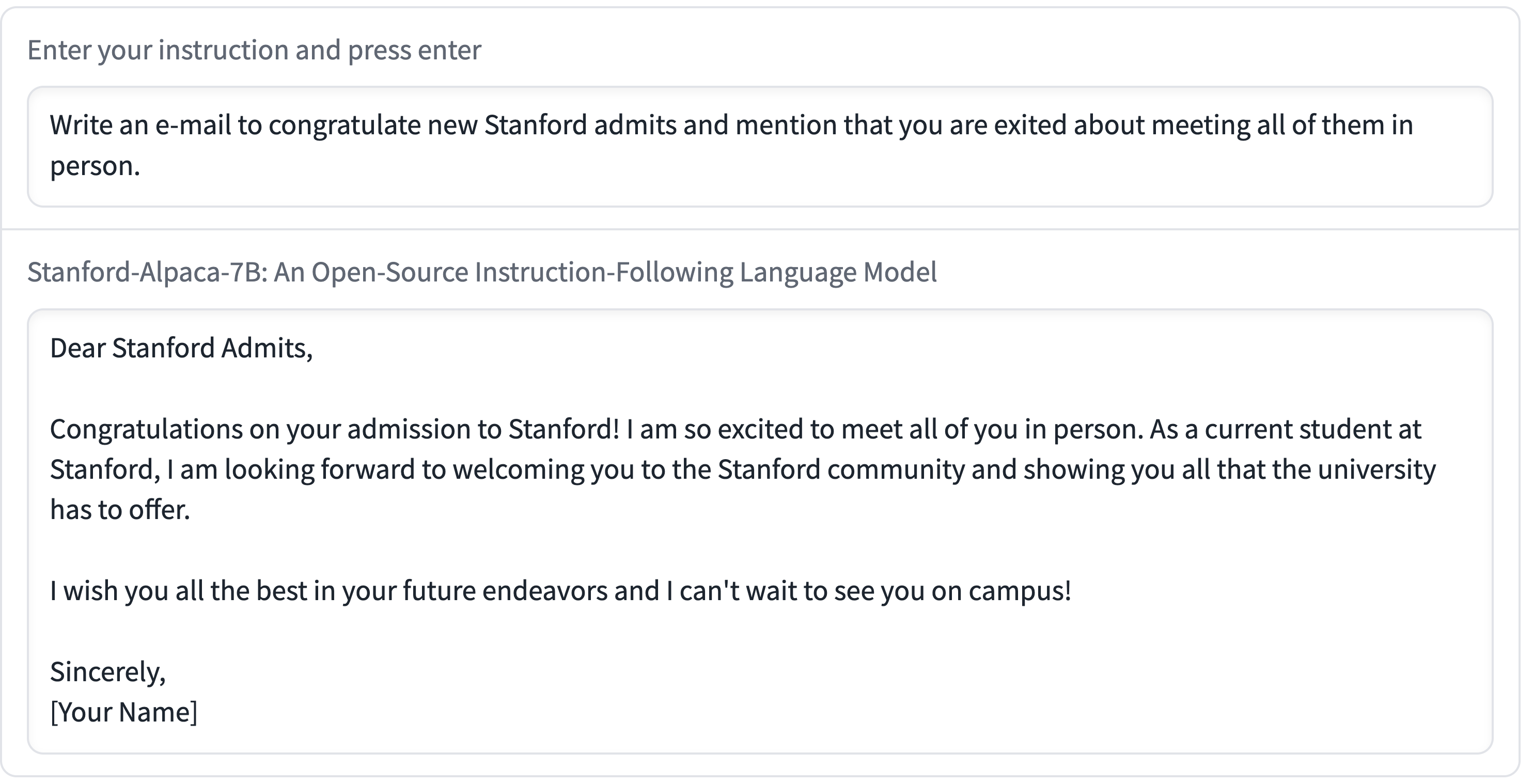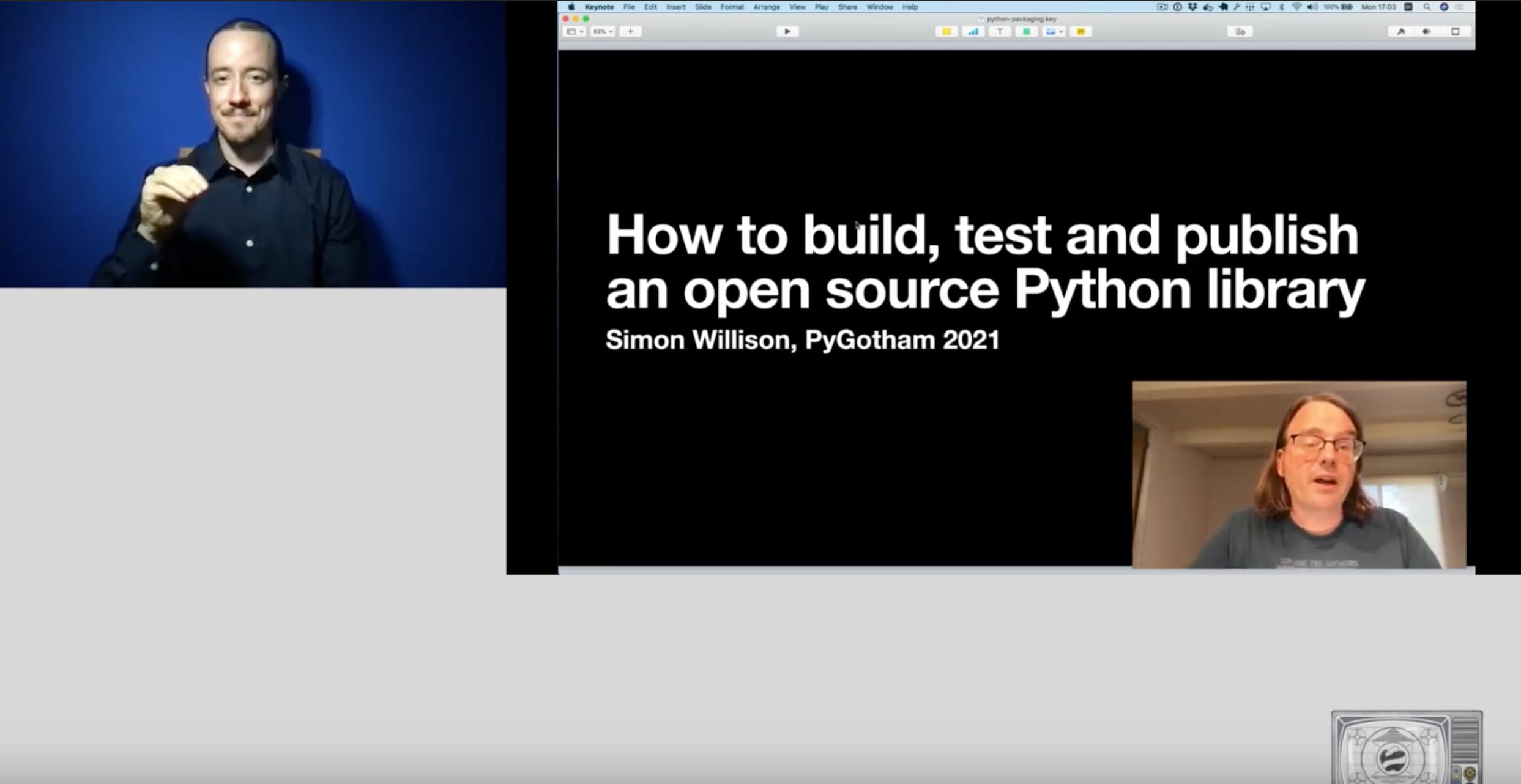291 posts tagged “open-source”
2023
Cerebras-GPT: A Family of Open, Compute-efficient, Large Language Models (via) The latest example of an open source large language model you can run your own hardware. This one is particularly interesting because the entire thing is under the Apache 2 license. Cerebras are an AI hardware company offering a product with 850,000 cores—this release was trained on their hardware, presumably to demonstrate its capabilities. The model comes in seven sizes from 111 million to 13 billion parameters, and the smaller sizes can be tried directly on Hugging Face.
bloomz.cpp (via) Nouamane Tazi Adapted the llama.cpp project to run against the BLOOM family of language models, which were released in July 2022 and trained in France on 45 natural languages and 12 programming languages using the Jean Zay Public Supercomputer, provided by the French government and powered using mostly nuclear energy.
It’s under the RAIL license which allows (limited) commercial use, unlike LLaMA.
Nouamane reports getting 16 tokens/second from BLOOMZ-7B1 running on an M1 Pro laptop.
Stanford Alpaca, and the acceleration of on-device large language model development
On Saturday 11th March I wrote about how Large language models are having their Stable Diffusion moment. Today is Monday. Let’s look at what’s happened in the past three days.
[... 2,055 words]Many people, and even a few companies, have contributed code to SQLite over the years. I have legal documentation for all such contributions in the firesafe in my office. We are able to track every byte of the SQLite source code back to its original creator. The project has been and continues to be open to outside contributions, as long as those contributions meet high standards of provenance and maintainability.
I’m Now a Full-Time Professional Open Source Maintainer. Filippo Valsorda, previously a member of the Go team at Google, is now independent and making a full-time living as a maintainer of various open source projects relating to Go. He’s managing to pull in an amount “equivalent to my Google total compensation package”, which is a huge achievement: the greatest cost involved in independent open source is usually the opportunity cost of turning down a big tech salary. He’s doing this through a high touch retainer model, where six client companies pay him to keep working on his projects and also provide them with varying amounts of expert consulting.
Igalia: the Open Source Powerhouse You’ve Never Heard of (via) An in-depth article about Igalia from July 2022. I had no idea how much stuff they had worked on: arrow functions, generators, async/await, MathML, CSS Grid and a whole bunch more.
2022
libsql (via) A brand new Apache 2 licensed fork of SQLite. The README explains the rationale behind the project: SQLite itself is open source but not open contribution, and this fork aims to try out new ideas. The most interesting to me so far is a plan to support user defined functions implemented in WebAssembly. The project also intends to use Rust for new feature development.
datasette on Open Source Insights
(via)
Open Source Insights is "an experimental service developed and hosted by Google to help developers better understand the structure, security, and construction of open source software packages". It calculates scores for packages using various automated heuristics. A JSON version of the resulting score card can be accessed using https://deps.dev/_/s/pypi/p/{package_name}/v/
Microsoft® Open Source Software (OSS) Secure Supply Chain (SSC) Framework Simplified Requirements. This is really good: don’t get distracted by the acronyms, skip past the intro and head straight to the framework practices section, which talks about things like keeping copies of the packages you depend on, running scanners, tracking package updates and most importantly keeping an inventory of the open source packages you work so you can quickly respond to things like log4j.
I feel like I say this a lot these days, but if you had told teenage-me that Microsoft would be publishing genuinely useful non-FUD guides to open source supply chain security by 2022 I don’t think I would have believed you.
Contributing to Complex Projects (via) Mitchell Hashimoto describes in detail his process for understanding and eventually contributing to a complex new codebase. I picked up a whole bunch of useful tips from this.
Support open source that you use by paying the maintainers to talk to your team
I think I’ve come up with a novel hack for the challenge of getting your company to financially support the open source projects that it uses: reach out to the maintainers and offer them generous speaking fees for remote talks to your engineering team.
[... 645 words]Writing better release notes
Release notes are an important part of the open source process. I’ve been thinking about these a lot recently, and I’ve assembled some thoughts on how to do a better job with them.
[... 918 words]2021
The Asymmetry of Open Source (via) Caddy creator Matt Holt provides “a comprehensive guide to funding open source software projects”. This is really useful—it describes a whole range of funding models that have been demonstrated to work, including sponsorship, consulting, private support channels and more.
How to build, test and publish an open source Python library
At PyGotham this year I presented a ten minute workshop on how to package up a new open source Python library and publish it to the Python Package Index. Here is the video and accompanying notes, which should make sense even without watching the talk.
[... 2,055 words]cinder: Instagram’s performance oriented fork of CPython (via) Instagram forked CPython to add some performance-oriented features they wanted, including a method-at-a-time JIT compiler and a mechanism for eagerly evaluating coroutines (avoiding the overhead of creating a coroutine if an awaited function returns a value without itself needing to await). They’re open sourcing the code to help start conversations about implementing some of these features in CPython itself. I particularly enjoyed the warning that accompanies the repo: this is not intended to be a supported release, and if you decide to run it in production you are on your own!
Observable Plot (via) This is huge: a brand new high-level JavaScript visualization library from Mike Bostock, the author of D3—partially inspired by Vega-Lite which I’ve used enthusiastically in the past. First impressions are that this is a big step forward for quickly building high-quality visualizations. It’s released under the ISC license which is “functionally equivalent to the BSD 2-Clause and MIT licenses”.
When building a tool, it’s easy to forget how much you’ve internalized: how much knowledge and context you’ve assumed. Your tool can feel familiar or even obvious to you while being utterly foreign to everyone else. If your goal is for other people to use the darn thing — meaning you’re not just building for yourself, or tinkering for its own sake (which are totally valid reasons) — you gotta help people use it! It doesn’t matter what’s possible or what you intended; all that matters is whether people actually succeed in practice.
Open source projects: consider running office hours
Back in December I decided to try something new for my Datasette open source project: Datasette Office Hours. The idea is simple: anyone can book a 25 minute conversation with me on a Friday to talk about the project. I’m interested in talking to people who are using Datasette, or who are considering using it, or who just want to have a chat.
[... 786 words]2020
Datasette: A Developer, a Shower and a Data-Inspired Moment (via) Matt Asay interviewed me over Zoom last month. This captures a lot of my thinking around open source really well: “Datasette is aggressively open source for a bunch of reasons. Most of them are very selfish reasons.”
New governance model for the Django project. This has been under discussion for a long time: I’m really excited to see it put into action. It’s difficult to summarize, but they key effect should be a much more vibrant, active set of people involved in making decisions about the framework.
2019
Weeknotes: PG&E outages, and Open Source works!
My big focus this week was the PG&E outages project. I’m really pleased with how this turned out: the San Francisco Chronicle used data from it for their excellent PG&E outage interactive (mixing in data on wind conditions) and it earned a bunch of interest on Twitter and some discussion on Hacker News.
[... 452 words]My JSK Fellowship: Building an open source ecosystem of tools for data journalism
I started a new chapter of my career last week: I began a year long fellowship with the John S. Knight Journalism Fellowships program at Stanford.
[... 876 words]Monaco Editor. VS Code is MIT licensed and built on top of Electron. I thought “huh, I wonder if I could run the editor component embedded in a web app”—and it turns out Microsoft have already extracted out the code editor component into an open source JavaScript package called Monaco. Looks very slick, though sadly it’s not supported in mobile browsers.
Datasette 0.28—and why master should always be releasable
It’s been quite a while since the last substantial release of Datasette. Datasette 0.27 came out all the way back in January.
[... 1,326 words]The Cloud and Open Source Powder Keg (via) Stephen O’Grady’s analysis of the Elastic v.s. AWS situation, where Elastic started mixing their open source and non-open source code together and Amazon responded by releasing their own forked “open distribution for Elasticsearch”. World War One analogies included!
sqlite-utils: a Python library and CLI tool for building SQLite databases
sqlite-utils is a combination Python library and command-line tool I’ve been building over the past six months which aims to make creating new SQLite databases as quick and easy as possible.
[... 1,237 words]2018
PEP 8016 -- The Steering Council Model (via) The votes are in and Python has a new governance model, partly inspired by the model used by the Django Software Foundation. A core elected council of five people (with a maximum of two employees from any individual company) will oversee the project.
for those open source companies that still harbor magical beliefs, let me put this to you as directly as possible: cloud services providers are emphatically not going to license your proprietary software. I mean, you knew that, right? The whole premise with your proprietary license is that you are finding that there is no way to compete with the operational dominance of the cloud services providers; did you really believe that those same dominant cloud services providers can’t simply reimplement your LDAP integration or whatever? The cloud services providers are currently reproprietarizing all of computing — they are making their own CPUs for crying out loud! — reimplementing the bits of your software that they need in the name of the service that their customers want (and will pay for!) won’t even move the needle in terms of their effort.
11 barriers to coding in the open and how to overcome them (via) “Terence Eden, open standards lead at GDS, also gave a talk about overcoming barriers to coding in the open”—an intriguing recap of that talk revealing exactly how the UK government have been encouraging a culture of coding in the open and going open source first.
The (broken) economics of OSS (via) This is worth reading: a very well thought-out summary of the challenges of financially supporting open source infrastructure projects in a world of cloud providers. Matt Klein is the creator of the Envoy proxy at Lyft. One of his conclusions is that the open source fellowship model (where foundations provide a full time salary to key maintainers) deserves more attention.

